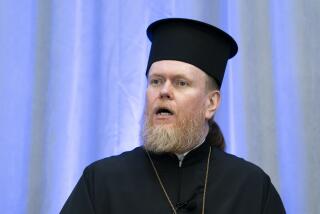Retreat on Gains in Religious Freedoms Not Seen as Likely : Coup attempt: Experts say that had seizure of power succeeded, new regime would not have have able to turn the nation back to atheism.
- Share via
NEW YORK — Amid the swift currents of change in the Soviet Union this week, experts said they were confident that gains in religious freedom made during the leadership of Mikhail S. Gorbachev would not be easily lost.
Communist atheism no longer holds the Soviet people’s trust and thus cannot be pushed on them to take the place of religion, said Rabbi Arthur Schneier, president of the interfaith Appeal of Conscience Foundation.
“That void has been filled by many people returning to their respective faith communities,” said Schneier, of New York. “There’s no way of going back to the old wave of anti-religious campaigns.”
Gorbachev was deposed in a military coup Monday, but thousands of Russian citizens rallied in defiance of the takeover leaders. Within two days, the retreat to old-style, hard-line Soviet communism crumbled.
While the coup lasted, another specialist on Soviet religious affairs predicted that any attempt to take back religious rights would fail.
“They’d be very foolish to try that. Things have gone too far for them to try to return to the Brezhnev era (of 1977-82),” said the Rev. Bruce Rigdon of Grosse Pointe, Mich., head of the U.S.-Soviet relations office of the National Council of Churches.
Rigdon, who has led numerous Christian delegations to the Soviet Union over the last decade and is thoroughly acquainted with religious leaders there, said it would take “very repressive” measures to reverse religious rights.
Evangelist Billy Graham led a five-day training school for 4,900 Soviet pastors last month. Noting the powerful new religious currents in Soviet life then, he said: “This is harvest time.”
That upsurge, including newly allowed religious classes for the young, religious volunteers serving in hospitals and social services, and opening of many new churches, has swelled steadily in recent years.
So has the emigration of Jews to Israel, the United States and elsewhere under newly relaxed emigration policies.
Schneier, who since 1965 frequently has been in the Soviet Union as head of the Protestant-Roman Catholic-Jewish foundation working for religious rights, said there has been “an explosion” of new religious activity there.
Last March he met in Moscow with Soviet officials, including then-Vice President Gennady I. Yanayev, who led this week’s takeover attempt.
Schneier said that in their conversation Yanayev expressed support for the new legislation on religious rights, freedom of conscience and for new emigration laws providing rights to leave the country.
Schneier said that before the recent “collapse of the ideology” of communism, many people had been committed to Marxist-Leninist atheism “as a semi-religion.”
But “it’s no longer the creed,” he said. “Most Soviet citizens had believed in it. People have to believe in someone or something. But millions have now left the Communist Party and turned to religion.”
In the circumstances, he said any Soviet government trying to gain public support is now dependent on the religious community.
More to Read
Sign up for Essential California
The most important California stories and recommendations in your inbox every morning.
You may occasionally receive promotional content from the Los Angeles Times.













